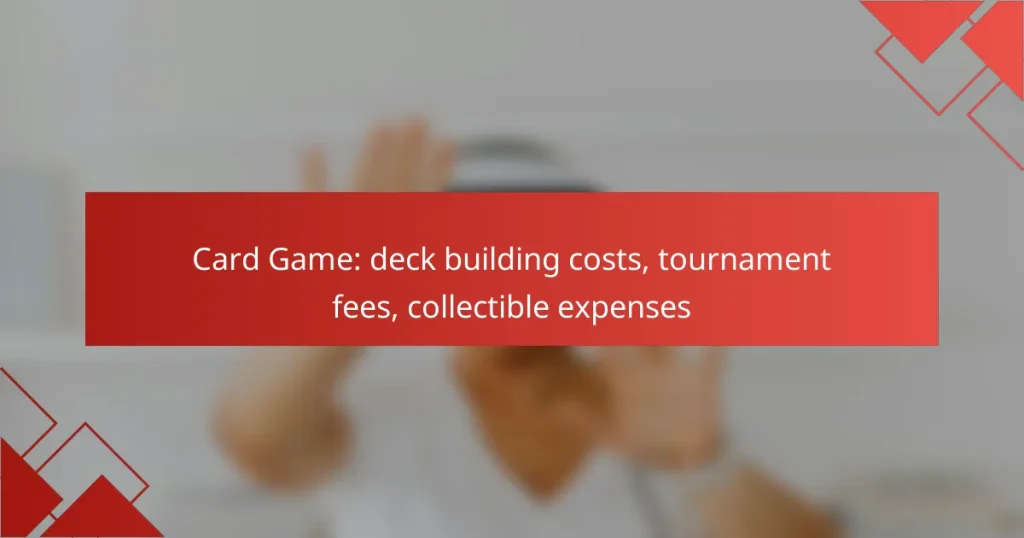Engaging in card games involves various costs, particularly in deck building, tournament fees, and collectible expenses. The investment in cards can vary widely, influenced by rarity and player strategy, while tournament fees typically range from £5 to £30 in the UK, depending on the event. Additionally, collectible expenses can fluctuate significantly based on demand and the game’s popularity, making it essential for players to budget accordingly.

What are the costs of deck building in card games?
The costs of deck building in card games can vary significantly based on the game, the cards chosen, and the player’s strategy. Players typically invest in purchasing cards, which can range from a few dollars to hundreds, depending on rarity and demand.
Average costs for popular games
In contrast, games like Pokémon may have lower entry costs, with effective decks available for $30 to $100. Players can often find starter decks or themed decks that provide a solid foundation without breaking the bank.
Factors influencing deck building expenses
Another factor is the player’s desired competitiveness. Casual players may spend less by focusing on fun or thematic decks, while competitive players often invest more to ensure they have the best cards available. Shipping costs and local availability can also impact overall expenses.
Cost comparison of different card games
Furthermore, collectible card games often require ongoing investments through expansions and new sets, while some games may have a one-time purchase model. Understanding these differences helps players budget effectively for their card game interests.

What are the typical tournament fees for card games in the UK?
In the UK, tournament fees for card games generally range from £5 to £30, depending on the event’s scale and prestige. Major tournaments may have higher fees, while local events often charge less, making it accessible for players of all levels.
Standard entry fees for major tournaments
Major card game tournaments in the UK typically charge entry fees between £20 and £50. These fees often cover venue costs, prize pools, and sometimes promotional materials. For example, a national championship might charge around £30, while international events can exceed £50.
Players should consider early registration discounts, which can reduce fees by a small percentage. Additionally, some tournaments offer tiered pricing based on the number of participants, so fees may vary as registration progresses.
Additional costs associated with tournaments
Beyond entry fees, players should budget for additional expenses such as travel, accommodation, and food. Depending on the tournament’s location, travel costs can vary significantly, especially if it requires overnight stays. Players attending events in major cities may find hotel prices to be higher.
Other potential costs include purchasing new cards or accessories to enhance gameplay. It’s common for players to invest in deck upgrades or protective sleeves, which can add £10 to £50 to their overall expenses. Being mindful of these costs can help players manage their tournament budgets effectively.

How do collectible expenses vary by card game?
Collectible expenses can differ significantly across card games, influenced by factors such as rarity, demand, and the game’s popularity. Players should consider these elements when budgeting for their collections, as costs can range from affordable to quite high depending on the specific game and cards involved.
Price ranges for collectible cards
Collectible card prices typically fall within a broad range, often starting from a few cents for common cards to several thousand dollars for rare or highly sought-after items. For example, in popular games like Magic: The Gathering or Pokémon, you might find cards priced anywhere from $1 to over $10,000, depending on their rarity and condition.
When building a deck, expect to spend anywhere from $50 to several hundred dollars for a competitive setup, particularly if you aim for high-value cards. It’s wise to research current prices and trends to avoid overspending.
Market trends affecting collectible card prices
Market trends play a crucial role in determining collectible card prices, with factors like game expansions, tournament results, and player interest influencing demand. For instance, a newly released set can cause certain cards to spike in value as players seek to build competitive decks.
Additionally, external factors such as economic conditions or the popularity of streaming platforms can impact the collectible card market. Keeping an eye on these trends can help collectors make informed purchasing decisions and identify potential investment opportunities.

What are the key factors to consider when budgeting for card games?
When budgeting for card games, consider initial costs, ongoing expenses, and potential tournament fees. Understanding these factors helps players manage their finances effectively while enjoying the game.
Essential expenses for new players
New players should anticipate several essential expenses, including the cost of starter decks, booster packs, and accessories like sleeves and playmats. Initial investments can range from $20 to $100, depending on the game’s complexity and the player’s preferences.
Additionally, players may want to budget for local events or casual play sessions, which might have small entry fees. Being aware of these costs upfront can prevent unexpected financial strain as players dive into the hobby.
Long-term financial planning for collectors
For collectors, long-term financial planning involves understanding the value of cards and the potential for price fluctuations. Collectible cards can vary widely in price, with some rare cards reaching hundreds or even thousands of dollars, while others may hold minimal value.
It’s wise to set a budget for acquiring new cards and to track expenses over time. Consider creating a checklist of desired cards and their market values to avoid overspending. Regularly reviewing your collection can help you make informed decisions about trades and sales, ensuring your investment remains sound.

How do regional differences impact card game costs in the UK?
Regional differences significantly influence card game costs in the UK, affecting everything from deck building expenses to tournament fees. Players in urban areas may face higher costs due to demand, while rural regions might offer more affordable options.
Cost variations across major cities
In major cities like London, Manchester, and Birmingham, the costs associated with card games can vary widely. For instance, a competitive deck may range from £100 to £500 in London, while the same deck could be found for £50 to £300 in smaller cities. This disparity is often due to higher rent and operational costs for local game shops in urban areas.
Additionally, the availability of exclusive cards and expansions can drive prices up in metropolitan areas. Players should shop around and compare prices at different stores or online platforms to find the best deals.
Local tournaments and their fees
Tournament fees can also differ based on location, with entry costs typically ranging from £5 to £30. Larger cities may host more prestigious events with higher fees, while local tournaments in smaller towns often charge less to encourage participation.
It’s essential for players to consider the potential travel expenses when entering tournaments outside their local area. Joining local gaming communities can provide insights into upcoming events and help players budget for both entry fees and travel costs effectively.

What are the emerging trends in card game expenses?
Emerging trends in card game expenses reflect a shift towards digital platforms and evolving collectible markets. Players are increasingly facing costs associated with both physical and digital card collections, as well as tournament fees that vary widely based on location and event type.
Impact of digital platforms on costs
Digital platforms have significantly influenced card game expenses by reducing some costs while introducing new ones. Online play often eliminates the need for physical cards, which can lower initial investment but may involve subscription fees or in-game purchases that add up over time.
Additionally, digital platforms frequently host tournaments with varying entry fees, which can range from free to several hundred dollars, depending on the prestige of the event. Players should weigh the convenience of online play against potential ongoing costs to maintain competitiveness.
Future predictions for collectible card markets
The collectible card market is expected to see continued growth, driven by increasing interest in both physical and digital formats. As new sets are released, collectors may face rising prices for rare cards, with some cards fetching hundreds or even thousands of dollars in secondary markets.
Future trends may also include more robust regulation of the resale market to protect consumers and ensure fair pricing. Players and collectors should stay informed about market dynamics and consider diversifying their collections to mitigate risks associated with fluctuating values.


